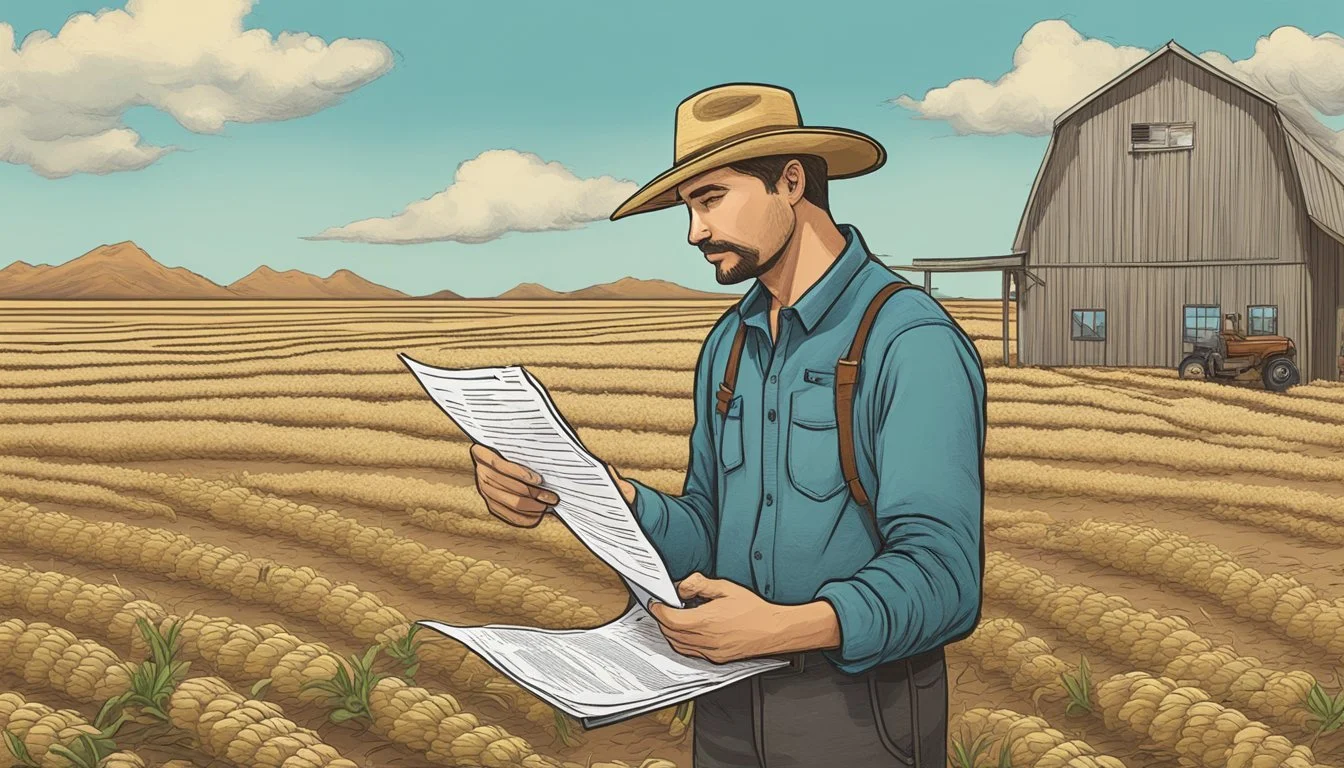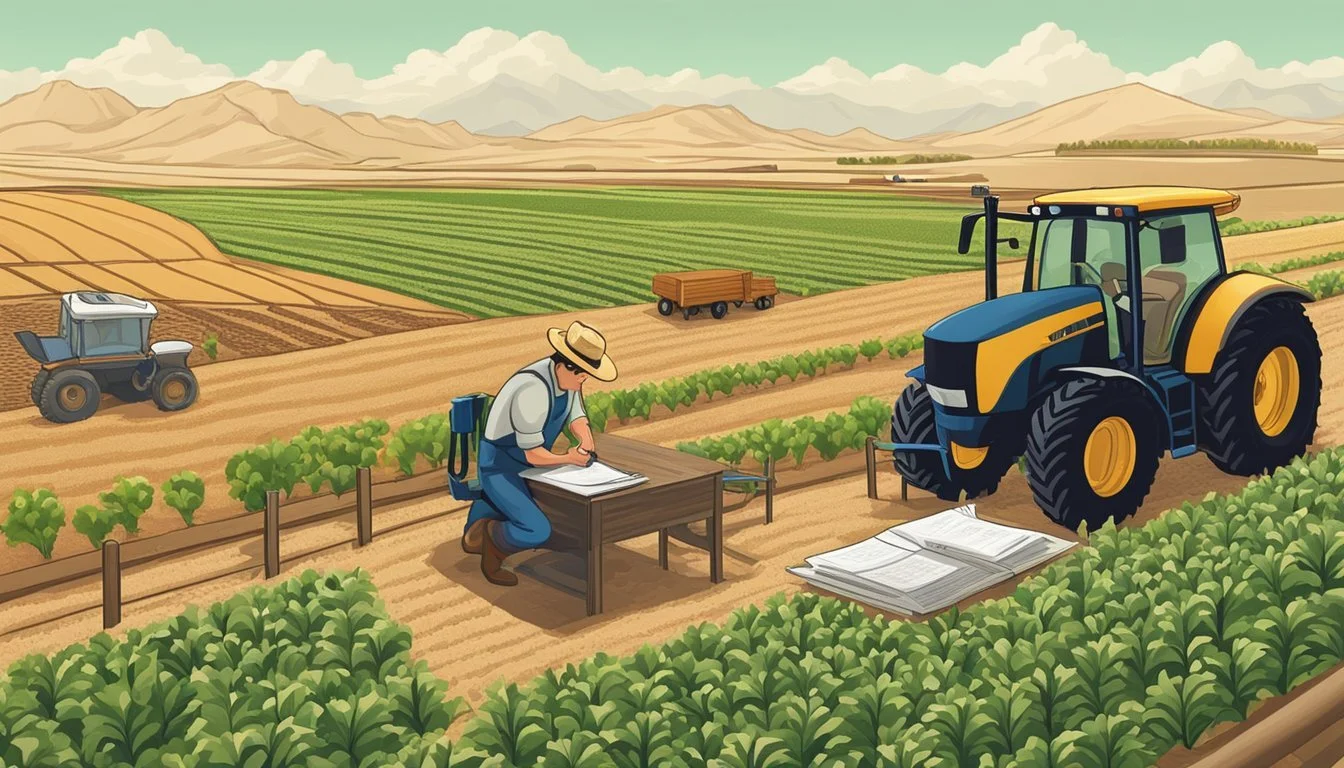Farm Loans in Arizona
Navigating Financial Options for Agriculturists
This Article is Part of Our Guide on Farm Loans for All 50 U.S. States
Agriculture is a significant contributor to Arizona's economy, and the state is home to a notable number of farms and ranches. Access to capital through farm loans is a crucial aspect of sustaining and growing agricultural operations within the region. These loans provide the essential funds farmers and ranchers need to purchase land, invest in improvements, and maintain the viability of their operations. Whether individuals are new to agriculture or have been in the industry for years, the financial support from various loan programs can be a critical factor in their success.
In Arizona, a variety of loan programs are available to meet the diverse needs of the agricultural community. These loan options range from financing the construction of storage facilities to purchasing new land or expanding existing properties. For ranchers and farmers seeking competitive interest rates, financing solutions and credit options are designed to cater to the unique challenges and opportunities in the agricultural sector. With the backing of reliable credit, farmers and ranchers can not only ensure the continued operation of their businesses but can also contribute to Arizona’s nearly $7 billion agriculture industry.
Partnerships with institutions such as the USDA Farm Service Agency, Farm Credit Services, and private financial entities like Farm Plus Financial play an indispensable role in supporting Arizona's agricultural economy. These organizations offer a suite of loan products, including low-interest options and programs specifically tailored for beginning farmers and ranchers. The availability of this financial assistance underscores a commitment to fostering a robust and enduring agricultural sector in Arizona.
Understanding Farm Loans
Farm loans are vital financial tools that enable Arizona's agricultural producers to start, maintain, and expand their operations. These loans are designed to meet the diverse needs and challenges faced by farmers and ranchers.
Basics of Farm Financing
Farm financing is essential to sustaining and growing agricultural operations. It provides the necessary funds to cover various farm-related costs, from purchasing new land to investing in equipment. Loans for farms come in different types, each serving a unique purpose in the agricultural sector.
Types of Farm Loans
Operating Loans: Help cover the daily costs associated with farm operations, such as seeds, fertilizers, and livestock feed.
Equipment Loans: Specifically aimed at financing the purchase of farm machinery like tractors, harvesters, or irrigation systems.
Farm Ownership Loans: Designed to assist in buying or expanding a farm property.
Microloans: Tailored for smaller, non-traditional, and niche operations, these loans provide a simplified loan process for needs under $50,000.
Youth Loans: Offered by the USDA to young individuals participating in 4-H clubs or FFA to support their agricultural projects.
Eligibility and Application
Eligibility for farm loans generally requires the applicant to have sufficient credit history and often a certain level of experience in farming. The applicant usually needs to display the capacity for loan repayment. The U.S. Department of Agriculture's Farm Service Agency (FSA) administers several loan programs for which farmers can apply through an online platform like farmers.gov or directly through their local FSA office.
Farm Loan Features
Direct Loans: Issued by the FSA and are typically for beginning farmers or those who cannot obtain commercial credit.
Guaranteed Loans: The FSA backs loans provided by commercial lenders, guaranteeing up to 95% of losses.
Interest Rates: Competitive rates offer affordability, especially for beginning or smaller-scale farmers.
Term Length: Varies depending on the loan type but is structured to ensure manageable repayment schedules.
Farm loans in Arizona are a critical element of agricultural business planning, providing the financing necessary for farmers and ranchers to maintain productivity and contribute to the industry's overall growth.
Farm Loan Options in Arizona
Arizona's diverse agriculture, including winter lettuce and cotton production, requires specific financial solutions to meet the needs of its farmers. The state offers a variety of loan programs to assist with land purchase, development, and operational costs.
State-Specific Programs
The USDA Farm Service Agency (FSA) administers state-specific programs that provide support to Arizona farmers. These programs include low interest loans for various agricultural needs such as constructing on-farm storage facilities and implementing soil and water conservation methods. The FSA's assistance is critical in a state where natural disasters can adversely affect agricultural operations.
Loan for Land Purchase and Development
Farmers in Arizona looking to acquire or expand their operations have access to land loans. These loans can facilitate the purchase of new land or the development of existing agricultural property. For instance, USDA's Farm Ownership Loans allow up to $600,000 for eligible recipients, which can also cover costs associated with closing, constructing buildings, and protecting environmental resources present on the land.
Operating Loans and Lines of Credit
Farm operating costs in Arizona, such as purchasing seed or other inputs, can be financed through operating loans. Additionally, operating lines of credit provide a flexible financial resource for farmers to handle the cyclical nature of farming and ranching. This ensures that operations continue smoothly despite variable market conditions and periods of high capital demand.
Federal Farm Loan Programs
Federal farm loan programs serve as a critical support mechanism for Arizona farmers, providing the necessary funds to initiate, develop, or maintain agricultural operations.
USDA Loan Programs
The United States Department of Agriculture (USDA) administers several farm loan programs intended to support a range of agricultural activities. Among these, Farm Storage Facility Loans (FSFL) are targeted towards producers requiring storage solutions such as grain bins and hay barns, aimed at enhancing market operations. The Farm Loan Discovery Tool is a resource farmers can utilize to identify loan opportunities, assess eligibility, and navigate through USDA's funding options.
For small and beginning farmers, as well as those partaking in non-traditional and specialty operations, the microloan programs offer a simplified application process. These tailored programs reflect USDA's commitment to the diversification of agriculture. Native American tribal loans are another specialized area of focus for USDA, ensuring that these communities receive appropriate support for their agricultural ventures.
FSA and USDA Resources
The Farm Service Agency (FSA) operates hand-in-hand with USDA to ensure lending services are accessible to all types of producers. They offer guidance and funds to help farmers with purchasing land, investing in equipment, or refinancing existing debts—critical factors for sustainable farm operations.
FSA notably caters to marketing assistance loans, granting producers interim financing at harvest time to meet cash flow needs without selling their commodities at potentially low market prices. FSA is inclusive in its approach, addressing the needs of a diverse array of borrowers, including those with limited farming experience or exploring innovative agricultural practices.
Support for Diverse Farming Communities
Arizona's agricultural sector offers a variety of programs aimed at supporting a diverse range of farmers and ranchers, including minorities, women, and youth. These programs provide essential financial assistance and educational opportunities to help these individuals establish and grow their agricultural businesses.
Starting as a Minority or Woman Farmer
The USDA Farm Service Agency (FSA) has earmarked portions of Direct Operating and Direct Farm Ownership loans, as well as Microloan funding, to assist historically underserved groups. These groups include women, African-Americans, Alaskan Natives, American Indians, and Hispanics. As they begin their journey in farming, these individuals can access guaranteed loans which are facilitated by the FSA through commercial lending institutions, offering another pathway to financial aid with the goal of successful farm establishment and sustainability.
Assistance for Youth and Educational Projects
The USDA recognizes the importance of nurturing the next generation of farmers and ranchers, providing Youth loans to individuals participating in 4-H clubs and FFA (Future Farmers of America). These loans are designed to support projects that span the realms of agriculture, from raising livestock to growing crops. Furthermore, the establishment of educational agricultural projects ensures that these young farmers are not only financially supported but also receive the essential knowledge and training required to thrive in the agricultural community.
Loan Usage and Management
When managing the financial aspects of farm operations in Arizona, farmers frequently utilize loans to cover operational expenses and fund improvements. These financial tools are pivotal for maintaining cash flow and investing in the future of agricultural enterprises.
Managing Farm Operating Costs
Farm operating loans are instrumental for farmers who need to cover day-to-day expenses. These loans can be applied towards:
Family living expenses: Essential for maintaining the wellbeing of those dependent on the farm's success.
Equipment: Critical for the efficient functioning of farm operations, including planting, harvesting, and processing.
Managing these costs effectively ensures the continuous operation of the farm and can prevent interruptions during critical farming periods.
Investments and Improvements
Farm ownership loans empower farmers to:
Purchase additional land, contributing to the expansion of their farm or ranch.
Construct and improve buildings necessary for storage or livestock.
For instance, the Farm Storage Facility Loan (FSFL) program supports the construction of:
Grain, biomass, and hay storage facilities.
Cold storage facilities for perishable commodities.
Utilizing these loans for strategic investments in infrastructure can enhance productivity and contribute to long-term agricultural sustainability.
Financial Planning and Assistance
When embarking on agricultural endeavors in Arizona, understanding the intricacies of financial planning and assistance is paramount. This includes comprehending the role of credit and capital, as well as identifying the appropriate funding sources that cater to the specific needs of farmers and ranchers.
Understanding Credit and Capital
Farmers and ranchers in Arizona must have a solid grasp of both credit and capital to navigate the financial aspects of their operations effectively. Credit refers to the ability of a farmer to borrow money with the promise to repay it at a later date, often with interest. This credit allows for the purchase of necessary items without immediate cash outlay, thereby providing liquidity for agricultural investment.
On the other hand, capital represents the financial assets or resources that farmers and ranchers have at their disposal, including cash, equipment, and inventory. Both elements are vital: credit is necessary to access borrowed funds for improvements and expansions, while capital is what ensures the feasibility of securing loans.
Key Entities Role in Financial Planning Credit Enables borrowing for investment and operational costs Capital Provides assets for security against loans Microloans Offer small-scale financing options USDA Service Center Sources of information and assistance for federal programs
Finding the Right Funding Source
Once the fundamentals of credit and capital are established, the focus shifts to selecting the correct funding source. The USDA Farm Service Agency (FSA) provides various loan programs that offer low-interest financing to support the construction of storage facilities and other critical farm necessities. Microloans are a specialized product from the FSA designed to meet the needs of small-scale farmers with a maximum loan amount up to $50,000, aiding in covering operational expenses like seeds, equipment, and livestock.
For larger financial needs, farmers may approach commercial lenders or cooperatives that offer different loan products. Additionally, it's important to explore the availability of grants, which are funds that typically do not require repayment.
Farmers and ranchers can visit their local USDA Service Center for assistance in determining eligibility for federal loan programs. These centers serve as vital resources, providing guidance on loan requirements and helping to simplify the application process for programs that offer relief to distressed borrowers and expedited aid for those facing financial challenges.
Dealing with Farming Risks and Challenges
Farmers in Arizona face multiple risks, from market volatility to natural disasters. Effective risk management and appropriate insurance coverage are critical, as is knowledge of disaster assistance options.
Risk Management and Insurance
Risk management strategies are essential for Arizona farmers to protect their operations from unpredictable variables that can affect their livelihood. Margin protection plays a pivotal role by safeguarding against the disparity between the cost of production and the selling price of crops. To this end, farmers often engage in various forms of agricultural insurance.
Federal Crop Insurance: Protects against the loss of crops due to natural disasters, or the loss of revenue due to declines in the prices of agricultural commodities.
Livestock Insurance: Covers livestock against mortality caused by accidents and other risks.
Farm Property Insurance: Secures buildings, equipment, and other farm infrastructure against potential risks.
Navigating Disaster Assistance
When disasters strike, immediate relief is crucial. Farmers can access several forms of disaster assistance, ensuring swift recovery and continuity of their agricultural enterprise.
Emergency Loans: The USDA provides emergency loans to help farmers recover from production and physical losses due to drought, flooding, and other natural disasters.
Disaster Type Emergency Loan Support Drought Loans to cover losses to crops, livestock, and infrastructure. Flood Funds for restoring property and replenishing livestock.
Non-insured Crop Disaster Assistance Program (NAP): Offers financial assistance to producers of non-insurable crops when low yields, loss of inventory, or prevented planting occur due to natural disasters.
These mechanisms are integral for farmers to manage the many uncertainties of agricultural production in Arizona.
Additional Resources and Information
Farmers in Arizona seeking financial assistance for various agricultural needs can avail themselves of tools and materials designed to streamline the loan application process and provide valuable information. These resources are crucial for enabling farmers to make informed decisions regarding the financial aspects of their operations.
Loan Assistance and Discovery Tools
The Loan Assistance Tool offered by the Farm Service Agency (FSA) is a user-friendly online resource designed to help farmers and ranchers evaluate their eligibility for various FSA loan programs. It simplifies the loan application process by guiding users with:
Clear Instructions: Step-by-step guidance through the application forms.
Eligibility Information: Quick assessment of qualification for different loan types.
In parallel, the Farm Loan Discovery Tool serves as a navigator for exploring available loan options, tailored to the specific needs and circumstances of agricultural producers.
FSA Loan Types: Detailed explorations of loan purposes and benefits.
Requirements Overview: Delineation of prerequisites for loan applicants.
Educational Materials and Fact Sheets
Essential for understanding the nuances of agricultural funding, educational materials, such as Fact Sheets, provide a wealth of information on various programs. They include:
Detailed Descriptions: Specifics on loan objectives, such as facility construction or conservation efforts.
Application Deadlines: Timely updates on when to apply for particular loans and programs.
These Fact Sheets are indispensable for farmers seeking information about the Farm Storage Facility Loans (FSFL) and other similar initiatives.
FSFL Program: Information on low-interest loans for new storage facilities.
Disaster Assistance: Guidelines for loans in response to physical losses due to disasters.










